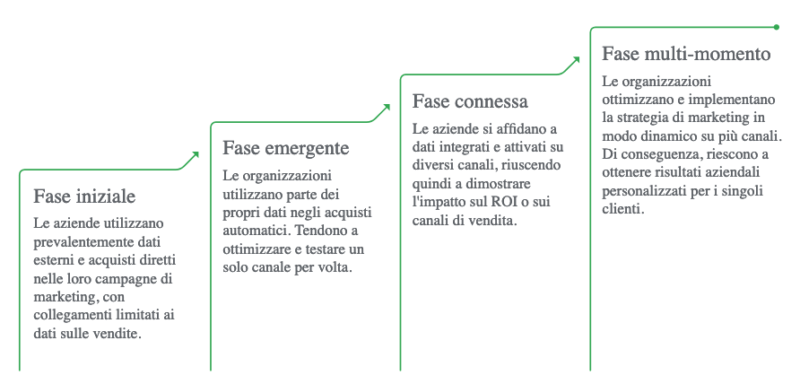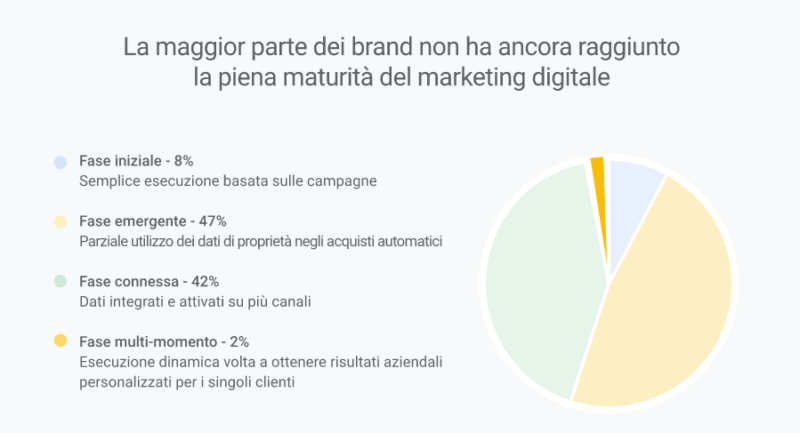By carefully analyzing the data and information derived from its research on the factors of success in marketing and the resources of 200 international companies, Boston Consulting Group identifies six technical and organizational factors determining to achieve digital maturity and emphasizes the importance of constant human supervision.

When brands adopt an advanced digital marketing strategy, they can record up to 20% more revenue and up to 30% lower costs.1 However, in its recent analysis of 200 international companies operating in multiple sectors, Boston Consulting Group (BCG) found that only 2% reached the “multi-stage” level in marketing, while the remaining organizations are still in one of the three previous stages of the digital maturity.
At the “multi-moment” level, companies use multiple channels and sophisticated automation techniques to generate a personalized, dynamic, and profitable user experience. However, BCG’s analysis reveals that most brands, including very large ones, are still in the “early” or “emerging” phase, with non-integrated campaigns and separate data across departments.

In addition to this broader research, BCG also conducted 16 tests on six major brands in France, Italy, Spain and the UK. According to the results, most companies that have reached digital maturity (“multi-moment” phase) generally have three key technical factors:
- Connected data: “multi-moment” marketing professionals combine data from various sources to develop creativity and activate marketing strategies targeted at the target audience and define audience segments based on behavior data. Their online to offline conversion touchpoints are largely, if not all, connected.
- Automation and Integrated Technology: Professionals who have reached the most advanced stage of digital marketing maturity use CRM and website data analysis suites to automate tasks and customize messages to maximize impact.
- Strategic Measurement: When companies operate at the “multi-moment” level, marketing objectives are linked to the common goals of the brand on different channels and are validated by sophisticated digital marketing attribution techniques. In one case, a company examined by BCG’s study used the information derived from data-based attribution to optimize advertising budgets and offers and managed to increase lead volumes by 6% and reduce the cost per lead by 17%.
Tests also revealed that applying these key technical factors generated surprising results quickly, with double-digit improvements in key metrics after just four to six weeks of implementation.

Marketing companies in the multi-moment phase also have three key organisational factors in common:
- Strategic partnerships: Direct control over their technology and proprietary data enables advanced organizations to collaborate more effectively with agencies and technology solution providers. The adoption by marketing teams of standardized methods of collaboration with agencies facilitates campaign development, while performance reviews help to keep budget, quality and timing in line with common marketing goals.
- Specialist skills: While many companies with a higher or lower level of maturity include roles of channel experts (including research, social and programme channels) and measurement personnel, the best marketing organizations offer advanced training in data science and analysis systems, as well as hiring industry experts to ensure that their teams also have these skills.
- Amile structures and “fail fast” culture:The involvement of senior management is essential for any organization that wants to reach even the initial levels of digital maturity. Subsequent progress depends on sharing best practice across teams and geographies, while multi-stakeholder organizations have agile multi-functional teams and a strong culture of experimentation and results analysis.
Finally, BCG’s research reminds companies engaged in the path to digital maturity that, even if they invest in new processes and technologies, they cannot afford to underestimate the intuition and expertise of their employees. The study data shows that human experience combined with technical solutions generates results that are on average 15% higher than the impact of technology alone.
Pubblicato il 3 October 2019



 Starsystem IT srl Business Center “Ponte Regio”, Loc. Fratte, 49 – 38057 Pergine Valsugana, Trentino, Italy
Starsystem IT srl Business Center “Ponte Regio”, Loc. Fratte, 49 – 38057 Pergine Valsugana, Trentino, Italy